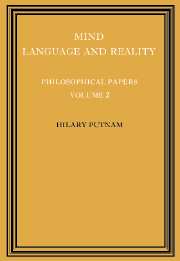Book contents
- Frontmatter
- Contents
- Dedication
- Introduction
- 1 Language and philosophy
- 2 The analytic and the synthetic
- 3 Do true assertions correspond to reality?
- 4 Some issues in the theory of grammar
- 5 The ‘innateness hypothesis’ and explanatory models in linguistics
- 6 How not to talk about meaning
- 7 Review ofThe concept of a person
- 8 Is semantics possible?
- 9 The refutation of conventionalism
- 10 Reply to Gerald Massey
- 11 Explanation and reference
- 12 The meaning of ‘meaning’
- 13 Language and reality
- 14 Philosophy and our mental life
- 15 Dreaming and ‘depth grammar’
- 16 Brains and behavior
- 17 Other minds
- 18 Minds and machines
- 19 Robots: machines or artificially created life?
- 20 The mental life of some machines
- 21 The nature of mental states
- 22 Logical positivism and the philosophy of mind
- Bibliography
- Index
16 - Brains and behavior
Published online by Cambridge University Press: 12 January 2010
- Frontmatter
- Contents
- Dedication
- Introduction
- 1 Language and philosophy
- 2 The analytic and the synthetic
- 3 Do true assertions correspond to reality?
- 4 Some issues in the theory of grammar
- 5 The ‘innateness hypothesis’ and explanatory models in linguistics
- 6 How not to talk about meaning
- 7 Review ofThe concept of a person
- 8 Is semantics possible?
- 9 The refutation of conventionalism
- 10 Reply to Gerald Massey
- 11 Explanation and reference
- 12 The meaning of ‘meaning’
- 13 Language and reality
- 14 Philosophy and our mental life
- 15 Dreaming and ‘depth grammar’
- 16 Brains and behavior
- 17 Other minds
- 18 Minds and machines
- 19 Robots: machines or artificially created life?
- 20 The mental life of some machines
- 21 The nature of mental states
- 22 Logical positivism and the philosophy of mind
- Bibliography
- Index
Summary
Once upon a time there was a tough-minded philosopher who said, ‘What is all this talk about “minds”, “ideas”, and “sensations”? Really – and I mean really in the real world – there is nothing to these so-called “mental” events and entities but certain processes in our all-too-material heads.’
And once upon a time there was a philosopher who retorted, ‘What a masterpiece of confusion! Even if, say, pain were perfectly correlated with any particular event in my brain (which I doubt) that event would obviously have certain properties – say, a certain numerical intensity measured in volts – which it would be senseless to ascribe to the feeling of pain. Thus, it is two things that are correlated, not one – and to call two things one thing is worse than being mistaken; it is utter contradiction.’
For a long time dualism and materialism appeared to exhaust the alternatives. Compromises were attempted (‘double aspect’ theories), but they never won many converts and practically no one found them intelligible. Then, in the mid-1930s, a seeming third possibility was discovered. This third possibility has been called logical behaviorism. To state the nature of this third possibility briefly, it is necessary to recall the treatment of the natural numbers (i.e. zero, one, two, three…) in modern logic. Numbers are identified with sets, in various ways, depending on which authority one follows.
- Type
- Chapter
- Information
- Philosophical Papers , pp. 325 - 341Publisher: Cambridge University PressPrint publication year: 1975
- 15
- Cited by



